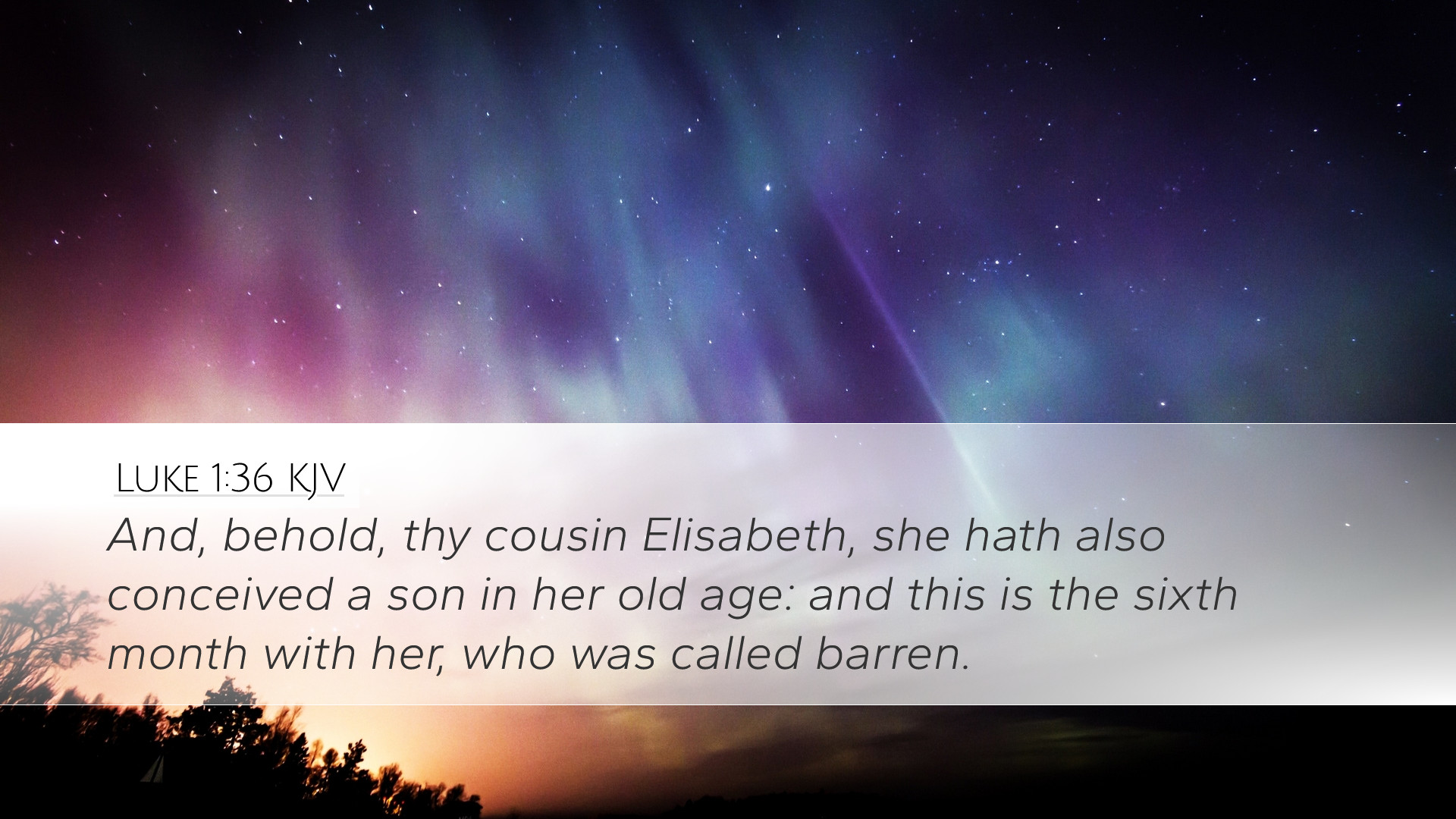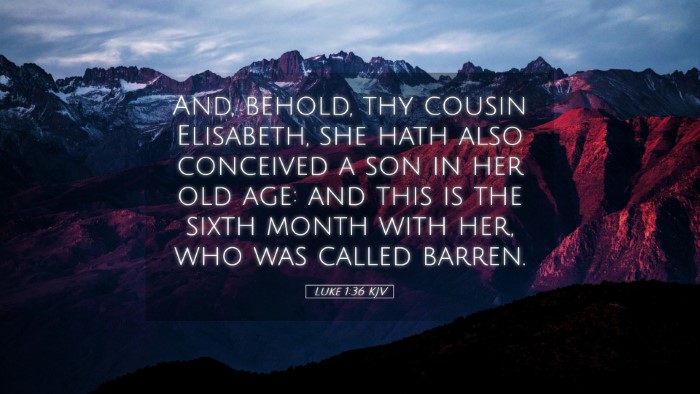Commentary on Luke 1:36
Luke 1:36 states: "And, behold, thy cousin Elizabeth, she hath also conceived a son in her old age: and this is the sixth month with her, who was called barren." This verse is rich with theological significance and provides a pivotal moment in the narrative of Christ's incarnation. Below, we draw on insights from esteemed public domain commentators such as Matthew Henry, Albert Barnes, and Adam Clarke to explore the depth of this passage.
Contextual Overview
This passage occurs during the Annunciation, where the angel Gabriel visits Mary to inform her about the miraculous conception of Jesus. It highlights not just the miracle in Mary’s life, but also the remarkable situation of her cousin Elizabeth, who is pregnant despite her advanced age and previous barrenness.
Insights from Commentators
Matthew Henry
Matthew Henry emphasizes the divine intervention present in both Mary’s and Elizabeth’s pregnancies. He notes that Gabriel’s mention of Elizabeth serves multiple purposes:
- Affirmation of God’s Power: Elizabeth, once considered barren, conceives through God’s grace, illustrating that nothing is impossible for God. This resonates with the overall message of the Gospel regarding faith in divine possibility.
- Encouragement for Mary: The angel's words aim to strengthen Mary’s faith. By presenting Elizabeth’s miracle, Mary is reminded that God’s promises can come to fruition, even where human limitations abound.
- The Importance of Community: The relationship between Mary and Elizabeth exemplifies the support and counsel that believers ought to provide one another, particularly in spiritual matters.
Albert Barnes
Albert Barnes approaches this verse with a historical and contextual lens, highlighting the significance of Elizabeth’s advanced age:
- Verification of the Miracle: By acknowledging Elizabeth, who was called barren, Barnes points out that the miraculous nature of both pregnancies is underscored. As a woman advanced in years, Elizabeth's pregnancy serves as a contextual anchor for Mary’s miraculous conception.
- Focus on God’s Sovereign Plan: Barnes stresses that Elizabeth’s situation reflects God’s sovereign will and plan for humanity's redemption through Jesus. The inclusion of Elizabeth’s pregnancy establishes a linkage between the Old Covenant (represented by Elizabeth) and the New Covenant inaugurated by Christ.
- Faith and Obedience: Barnes underscores Mary’s ability to believe and act upon the message furthered by Gabriel. The role of obedience and faith intertwines with God’s miraculous workings.
Adam Clarke
Adam Clarke provides a detailed examination of the social and theological implications of Elizabeth's conception:
- Barren No More: Clarke points out the societal stigma associated with barrenness in biblical times. He notes that God’s action in Elizabeth’s life serves as a profound statement on grace, dignity, and divine favor irrespective of social norms.
- Symbolism of Elizabeth’s Son: Clarke identifies the importance of John the Baptist, the child to be born of Elizabeth. He denotes John as the forerunner to Christ, indicating a preparatory role for the coming of the Messiah. This enhances the urgency and significance of Christ's incarnation.
- Interpersonal Dynamics: He also highlights the relationship between Mary and Elizabeth. Their shared experiences of miraculous conception form a bond of faith and expectation, showcasing the strength of spiritual kinship.
Theological Applications
The theological implications of Luke 1:36 are multidimensional:
Divine Sovereignty
This verse assures believers of God’s omnipotence. The unexpected pregnancies of both Elizabeth and Mary illustrate that God orchestrates events according to His divine will and purpose, transcending human limitations and norms.
Faith and Trust
Mary’s readiness to accept Gabriel's message can inspire contemporary Christians to trust in God’s promises. The acknowledgment of Elizabeth’s situation serves to bolster this trust, as it reveals the active hand of God in impossible situations.
Support and Community
The relational aspect between Mary and Elizabeth highlights the nature of Christian support. Believers are called to uplift one another, especially during challenges and divine assignments, fostering an environment that nurtures faith and obedience.
The Preparation for the Gospel
Elizabeth’s miraculous conception also sets the stage for the ministry of John the Baptist. It signifies a transitional moment in salvation history, heralding the arrival of the Savior. Understanding this transition can deepen a pastor’s or scholar's insight into biblical narratives and their interconnections.
Conclusion
Luke 1:36 invites us to reflect on the ways in which God acts in our lives and the lives of others. It serves as a powerful reminder that God’s timing and plans often surpass our understanding. Through the lens of traditional commentaries, we see the richness embedded within this single verse, encouraging theological reflection and a deeper appreciation of God's marvelous works.


